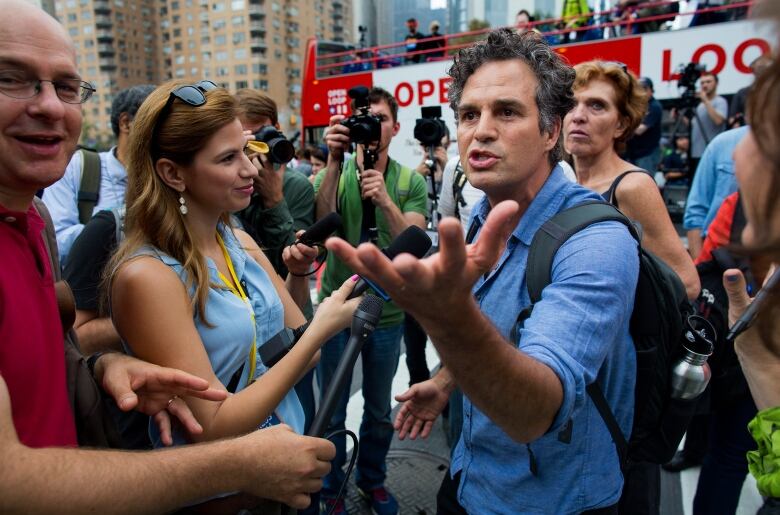Royal Bank defends funding B.C.’s Coastal GasLink pipeline despite environmental concerns
Royal Bank of Canada’s chief executive defended the bank’s funding of the Coastal GasLink pipeline Thursday and called for incentives to help the shift to a net-zero economy, as investors and Indigenous groups denounced its support of fossil fuels.
Chief executive Dave McKay was speaking at the bank’s annual shareholder meeting, which had been changed to a virtual-only format late on Wednesday after confirmation of a positive case of COVID-19 among its staff.
Wet’suwet’en hereditary chiefs had travelled from British Columbia to Toronto to express their opposition in person to RBC’s financing of the pipeline’s construction on traditional Indigenous land. The pipeline is 65 per cent owned by private equity firm KKR & Co. Inc. and the Alberta Investment Management Corp.
Calling into the meeting, they accused the bank of funding a project that they said has damaged rivers and wetland forests and limited their ability to hunt wildlife.
McKay said the project has been extensively reviewed and approved by regulators and has the support of all 20 elected First Nations along the route. He added that 16 of them have taken the option to have an economic interest in it.
Despite support from elected leaders, the pipeline still faces fierce opposition from several groups, most notably Wet’suwet’en hereditary chiefs who say band councils — as political entities created by the federal government — do not have authority over land beyond reserve boundaries.
That job, they say, belongs to hereditary chiefs under the Wet’suwet’en governance system which predates the formation of Canada and has not been extinguished.
Continued funding of fossil fuel companies
Canada’s major banks, including RBC, the largest, have released plans to lower their financed emissions but continued funding of fossil fuel companies and pipelines has riled some investors and communities.
Last week, Canada released a $9.1-billion plan to meet its 2030 emissions-reduction targets.
Spending on green technologies is set to be a focal point of the 2022 budget, to be released later on Thursday.
The Canadian government’s plan to reduce carbon emissions will lead to “a massive shift in this decade,” which will require “public and private capital to support both growth and the green transition,” McKay said.
“That’s why investment and tax policies, as well as incentives must be considered.”
McKay also reiterated his concern about a proposed tax on banks’ profits.
Two shareholder proposals urging RBC to exclude fossil fuel activity and projects opposed by Indigenous groups from eligibility for sustainable financing, and refrain from funding and advising on the privatization of pollution-intensive assets were defeated, in line with the board’s recommendation.
Pipeline a challenge to emission targets
Once completed, the Coastal GasLink pipeline will carry natural gas from near Dawson Creek in northeast B.C. to the LNG Canada processing plant on the coast in Kitimat.
That project has been described by the Canadian Centre for Policy Alternatives as a “carbon bomb” that is incompatible with the province’s carbon reduction goals.
Speaking to CBC this week, B.C.’s minister for environment, George Heyman, said the emissions associated with Phase 1 of the LNG Canada plant are accounted for in the models laid out by the Clean B.C. plan. The province has said details on the program for reducing emissions from industries will be released in 2023.
But the Sierra Club B.C., which is suing the province for failing to provide a detailed plan to achieve emissions targets, says the full emissions enabled by the LNG Canada terminal in Kitimat alone would make it nearly impossible to meet the province’s targets.
Hollywood criticism

RBC’s support of the pipeline has also drawn criticism from high-profile Hollywood stars including The Avengers stars Mark Ruffalo, Robert Downey, Jr. and Scarlett Johannson.
In an interview with CBC, Ruffalo said he banks with RBC subsidary City National Bank and so feels responsible to push the bank to stop funding the pipeline.
“As much as they speak about being champions for climate change and being champions of Indigenous rights and Indigenous people, everything that I’ve seen is absolutely contrary to those two claims,” Ruffalo said.
But Crystal Smith, elected chief councillor of the Haisla Nation in northwest B.C. and one of the supporters of Coastal GasLink, said the actor failed to understand the benefits of the pipeline project in providing jobs and money and supporting cultural revitalization and education initiatives for Indigenous people in the region.
“It’s done more for economic reconciliation than any other project,” she told CBC.
As for the divide between hereditary and elected Wet’suwet’en leaders over whether to support the project, Smith said disagreements are to be expected among any group of people and that it is up to members of the nation to decide how to move forward.

